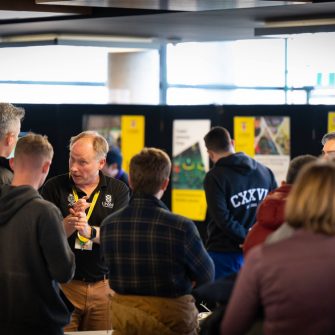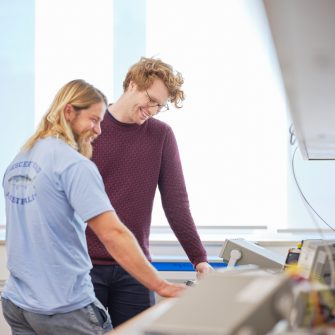Bachelor of Arts (Canberra)
- Commencing Terms
- Semester 1
- Duration
- 3 Year(s)
- Delivery Mode
- Face-to-face (includes blended)
- Campus
-
Canberra
- Codes
- UAC code 450001
- Program code 4400
- CRICOS code -
-
ATAR/2025 lowest selection rank
- 75.0 View all admission criteria
-
2026 Indicative first year full fee
- $12,500*
-
2026 Indicative full fee to complete degree
- $38,000*
-
2026 Indicative first year full fee
- -
-
2026 Indicative full fee to complete degree
- -

The Australian Defence Force Academy
Combining teaching and research with military education
UNSW Canberra specialises in high-quality undergraduate and postgraduate courses in all areas relating to military, strategic and defence studies. This means future leaders of the Navy, Army and Air Force can combine their military and leadership training with our world-class university programs and defence industry expertise.
- Overview
- Entry requirements
- What will I study?
- Future careers
- How to apply
- Fees
Overview
Leverage the defence and security related expertise of UNSW Canberra with the flexibility of a Bachelor of Arts degree. Pursue your interests and career aspirations across a range of disciplines including languages, history, politics and business.
You’ll develop transferable skills and in-depth knowledge in this undergraduate degree. Through your study at UNSW Canberra you’ll gain the tools to think critically, communicate effectively and conduct independent research.
Key features
Learn from the best
The UNSW Canberra School of Humanities and Social Sciences is recognised for its academic excellence in both research and teaching. We offer an outstanding higher education experience for our unique and diverse student population, with the best university teacher-to-student ratio in Australia. Our researchers and teaching staff are experts in their fields and are dedicated to developing future global leaders in defence and industry.
Benefit from specialised facilities
UNSW Canberra at ADFA is home to several unique state-of-the-art facilities. When you study with us, you’ll have exclusive access to the UNSW Canberra Academy Library Special Collections. Items of national significance include more than 300 manuscript collections, 13,000 rare items and papers of the former Prime Minister John Howard.
Learn through a unique lens
Our strength lies in our defence and security teaching and research. With us, you can enjoy the benefits of UNSW and ADFA’s unique community – we've educated leaders in defence, government and industry for more than 50 years.
Why study at UNSW Canberra?
Expand your thinking
This undergraduate degree will enrich your understanding of the world, challenge you to think outside the box, and become a creative problem solver who can tackle challenges across a range of industries.
Become a leader
A UNSW Canberra Bachelor of Arts degree gives you strong communication and research skills - essential attributes of effective leaders in the Australian Defence Force and successful graduates seeking a career in the public or private sector.
Develop a varied skillset to suit any role
You’ll develop your abilities in critical analysis and argument as well as an awareness of the value of language as a political, intellectual, creative, and communicative tool. This degree has a wide range of courses and electives come together to offer majors in Business, Geography, History, Indo-Pacific Studies and International & Political Studies (IPS).
Want to see more from UNSW Canberra at ADFA?
Entry requirements
-
- The 2025 Lowest Selection Rank (LSR) is the adjusted rank (ATAR plus adjustment factors) you would have needed to gain entry to this degree in 2025.
- The 2025 A levels score is based on four Advanced Level (A2) subjects. Entry scores are calculated from the best three or four A2 subjects (excluding repeated subjects) using the following values: A*=6, A=5, B=4, C=3, D=2, E=1. At most one Applied A Level subject may be included in the best four subjects used to calculate the aggregate.
- The 2025 IB Diploma is an indication of the IB you would have needed to gain entry to this degree in 2025. It is to be used as a guide only.
- The 2025 Lowest ATAR is the lowest ATAR (before adjustment factors were applied) to which an offer was made. Where <5 is listed, this indicates that less than 5 ATAR-based offers were made and so the score has not been published. N/A indicates no offers were made on the basis of ATAR.
*The Lowest ATAR to which an offer was made, for this program, is based on a UNSW Gateway Early Conditional Offer.
-
At UNSW, we are committed to ensuring prospective students have all the information they need in order to make informed decisions about their study options.
To assist you in gaining a better understanding of how Admissions works at UNSW, we have provided you with a summary of ATAR offers and the student profile.
We hope this information will help you identify the degree that is right for you.
Additional Selection Criteria
Undergraduate entry to the Australian Defence Force Academy (ADFA) is open to Australian residents who are members of the Australian Defence Force and selected members of overseas Armed Forces. Trainee Officers are selected by one of the three services (Navy, Army or Airforce) in the Australian Defence Force and must also meet academic entry requirements for UNSW Canberra at ADFA. Applying for ADFA is a dual application process. As selection for the Australian Defence Force is a competitive process, which can take up to 12 months, it is preferable that you apply to Defence Force Recruiting in Year 11. Visit this site for more information on both application processes.
Adjustment Factors
We offer a range of adjustment factor schemes that reward students for academic performance and extra-curricular achievements. These schemes also take into account a range of personal and educational disadvantages that may have affected your studies.
HSC Plus
This scheme rewards students who perform well in Year 12 subjects that are relevant to their preferred UNSW degree. You may be awarded up to five points.
Elite Athletes, Performers and Leaders (EAPL)
This program recognises achievements in the areas of sport, academia, leadership and music at an elite level. You may be eligible for up to five points.
Educational Access Scheme (EAS)
Factors such as illness, financial hardship, language difficulties or attending a particular school can mean you don't always get the best possible marks in Years 11 and 12. If one of these situations applies to you, submit an application for the Educational Access Scheme (EAS) via UAC. Eligible students can receive between 1 and 10 points towards their chosen UNSW degree.
Admission pathways
Your ATAR is not the only measure of your potential to succeed, which is why we offer a range of pathways into university. Explore your options below and get in touch with our Future Student Advisers to discuss your path to UNSW.
Gateway Admission Pathway
This scheme is open to students who attend Gateway schools, live in a low-socioeconomic area based on IRSAD and IEO indexes of SEIFA criteria, or are an Aboriginal and Torres Strait Islander person. It adjusts the ATAR requirements for your preferred UNSW degree and provides early offers and early conditional offers to UNSW.
Entry programs for Australian Aboriginal and Torres Strait Islander people
We offer entry programs for Indigenous Australians, including the Indigenous Preparatory Programs and the Indigenous Admission Scheme (IAS). The entry pathway program you apply for will depend on the degree you want to study.
English language requirements
You may be asked to provide evidence of your English proficiency to study at UNSW depending on your educational background and citizenship. English language skills are vitally important for coping with lectures, tutorials, assignments and examinations - this is why UNSW requires a minimum English language competency for enrolment.
If you’re completing an Australian Year 12 qualification (e.g. NSW HSC or equivalent), you do not need to provide anything extra to prove your proficiency. Your qualification will be used as evidence of your English proficiency.
If you do need to provide evidence of your English proficiency, this will be indicated in your application. You can prove this by providing evidence that you meet one or more of the following criteria:
- English language tests and university English courses
- Prior study in the medium of English
- Other qualifications
If you need to improve your English skills before you start your degree, UNSW College’s Academic English Programs are for you. The programs are suitable for various English levels and help you prepare for university studies and life in Australia.
For more details, visit the English Language Requirements page.
What will I study?
UNSW is introducing a new academic calendar from 2028.
We are moving to a new flex-semester calendar. What does this mean for your studies?
Program structure
Arts degrees at UNSW are flexible, allowing you to choose from a variety of study areas and keep your options open. The skills you develop in critical thinking, leadership, and management are transferable to almost any role and will equip you for an exciting and fulfilling career in the Australian Defence Force within the Navy, Army or Air Force.
Choose from a diverse range of courses and electives when you select up to two majors in:
- Business
- Geography
- History
- Indo-Pacific Studies
- International & Political Studies (IPS)
Full program structure
Students must complete 144 UOC when taken as a stand-alone program.
You’ll complete either:
1. A major specialisation (48 UOC)
2. A minor specialisation (36 UOC)
3. Upper-level Arts electives (12 UOC)
OR
1. A major specialisation (48 UOC)
2. A second major specialisation (48 UOC)
You will also need to complete:
1. Prescribed Elective courses (12 UOC)
2. Free Elective courses (24 UOC)
3. General Education courses (12 UOC)
-
- Business
- Geography
- History
- Indo-Pacific Studies
- International and Political Studies
-
- Business
- Geography
- History
- Indo-Pacific Studies
- International and Political Studies
-
- Introduction to Cyber-Security: Policy & Operations
- Fundamentals of Data Analysis
-
- Any level 1 course offered by UNSW Canberra
-
One of the following:
- Introduction to Strategic Studies
- Strategy, Management and Leadership
And one of the following:
- Law, Force and Legitimacy
- Introduction to Military Ethics
Chief of the Defence Force Program
The Chief of the Defence Force (CDF) programs offer the opportunity for students entering UNSW Canberra with a high Entrance Rank, and who maintain a high level of performance in their studies, to undertake research in a range of disciplines that will develop their critical thinking and independent research skills beyond that available in the standard Bachelor degree programs.
The range of CDF programs includes specialist courses in critical analysis and/or research methods related to the area of study. All programs also include discipline-specific research projects. The research projects will be supervised by academic staff from the relevant discipline. With the approval of the Head of School, cross-disciplinary projects may be undertaken. Students in the research courses may work independently or as part of a team, depending on the nature of the project undertaken, though all students will submit an individual assessment. The final assessment will be based on a written paper or report and oral presentations.
Throughout the program, students will be engaged in cohort activities including invited lectures, seminars, general reading and social events.
Future careers
This degree will help you develop skills such as strong written and oral communications skills, the capacity to research, criticise and reflect, and the ability to work independently and collaboratively.
Potential roles
- Maritime Warfare Officer
- Pilot
- Intelligence Officer
- Logistics Officer
- Air Combat Officer (mission aircrew)
- Human Resource Manager
- Army Officer in a variety of corps
“Studying at UNSW Canberra as a Trainee Officer has provided me with an amazing opportunity to study with world-class lecturers. The small class sizes have helped me to gain a more thorough understanding of course content.”
Jade Burton, Bachelor of Arts Student
How to apply
Applications for undergraduate study from domestic students (Australian citizens, Australian permanent residents, Australian permanent humanitarian visa holders and New Zealand citizens) are processed by the Universities Admissions Centre (UAC).
Visit the Apply section of the UAC website and you can nominate up to five degrees in order of preference, with the first being your most desired degree and university.
On-time applications for admission usually close at the end of September each year for Term 1 admission. Late applications can be submitted, but a late fee will apply. For study starting in Term 1, the majority of offers are made in December and January. Visit the UAC website for key dates for admission outside of Term 1.
Applying for programs at UNSW Canberra at ADFA is a dual application process. In addition to applying via UAC you will also need to apply via ADF Careers for an officer role within the Australian Defence Force. As selection for the Australian Defence Force is a competitive process, which can take up to 12 months, it is preferable that you apply to Defence Force Recruiting in Year 11.
Visit our how to apply page for more information on both application processes.
Ready to start your application?
Fees & Scholarships
Progress starts here – at a world-leading university

Top 20 Worldwide
Ranked in the global top 20 for three consecutive years
QS World University Rankings, 2024–2026

Winner of the AFR Most Employable University Award six years in a row
AFR Top100 Future Leaders Awards, 2020–2025

Australia's #1 for Innovation
Highest number of startups and spinouts from university-developed tech
SCOPR report, 2024



